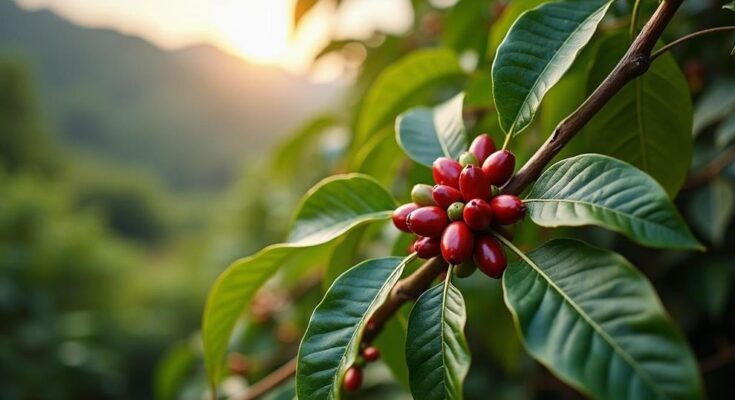Vietnam’s severe drought poses a threat to its robusta coffee bean production, with potential crop shortages of up to 10% this year. Coupled with Brazil’s frosty conditions affecting arabica beans, coffee prices are rising. The situation reflects wider issues of climate change impacting global agriculture, leading to increased food prices and potentially higher inflation rates.
A severe drought in Vietnam is adversely affecting the production of robusta coffee beans, potentially impacting global coffee prices significantly. As the world’s second-largest coffee producer and leading grower of robusta beans, Vietnam’s crop is projected to fall as much as 10% short of its usual annual output due to the worst drought in a decade. This decline in supply has already led to a surge in robusta futures, reaching levels unseen in nearly fifty years. Additionally, Brazil’s frosty weather has hindered its arabica bean production, contributing to ongoing global coffee shortages and rising prices. The implications of these developments extend beyond coffee enthusiasts. They underscore a larger narrative about the effects of climate change on agricultural productivity. Erratic weather patterns are resulting in smaller harvests for various staple crops, which invariably leads to increased food prices and inflation. A study predicts that the climate crisis could elevate global inflation rates annually by more than one percentage point by the year 2035, an issue that central banks often overlook in their inflation metrics. This oversight could result in broader economic impacts as traditional monetary policy tools, such as interest rate hikes, prove inadequate in countering price rises stemming from decreased yields. On an individual level, the volatility and potential increase in agricultural commodity prices signal both challenges and opportunities. Investors may find it prudent to explore ventures into agricultural technologies that improve farm productivity and facilitate food cultivation in controlled environments.
Vietnam plays a crucial role in the global coffee industry, being the second-largest coffee producer and the foremost grower of robusta beans. The country’s agricultural output is significantly influenced by climatic conditions, which have become increasingly unpredictable due to climate change. The drought currently affecting Vietnam is not an isolated incident; it follows two consecutive years of declining coffee yields, raising concerns about food security and economic stability. Additionally, other coffee-producing regions, such as Brazil, are facing their own climate-related challenges, compounding the overall supply issues in the coffee market. Understanding these dynamics is essential for laying bare the complexities of supply and demand within the context of global agricultural trends.
In conclusion, the drought in Vietnam and adverse weather conditions in Brazil present significant challenges to the coffee industry, likely leading to sustained increases in coffee prices. These events highlight the broader implications of climate change on agricultural productivity and food prices, suggesting that consumers and investors alike must remain vigilant in navigating the evolving landscape of the global coffee market. As volatility in commodity prices is expected to rise, there may be new opportunities for investment in innovative agricultural technologies designed to enhance productivity.
Original Source: finimize.com




